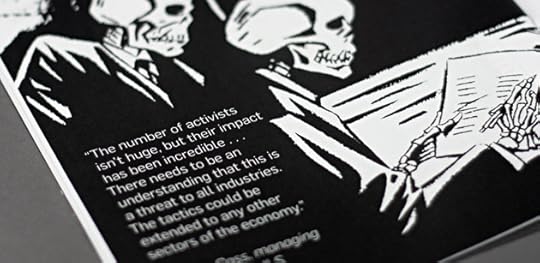CrimethInc.'s Blog, page 16
April 15, 2013
Steal Something from Work Day 2013

To celebrate this year’s Steal Something from Work Day, we present a critical essay on the possibilities and limitations of stealing time at work as a revolutionary practice. Our contributor is one of the countless grad students who have better odds of participating in an anarchist revolution than landing a tenure track position. Like anything stolen from work, this text bears the imprint of the context in which it was created—yet hints at what it will take to abolish that context. Thieves of time, one more effort to steal back the world!
Meanwhile: Steal Something from Work Day auf Deutsch.
A Theft or Work?
Why Steal Something from Work Day Means Burn Down the Internet
La Perruque, “the Wig”
It is impossible to steal from work. If you are at work, you are either an employee or a boss, or else both. A boss cannot steal from work because he or she already owns the apparatus of production; an employee cannot steal from work because working means being part of that apparatus. If I get away with it, the staplers and printer cartridges my bag are just a category mistake, a peculiar misgrouping of my little hands with other company property. If I don’t, they are a trail of evidence proving that I was never really an employee.
The labor of workplace theft is a ruse, but the ruse rouses. The soul is an engine calibrated for pursuing the impossible: as long as capitalism makes equipment out of people, people will make off with equipment. This is a sign of life. The question is how the ruse relates to capitalism, how capitalism absorbs and reverses it, and whether the ruse can help us to abolish capitalism.
Let’s begin with the labor of stealing back your time, if only because that may be your primary workplace activity. Michel de Certeau, a hybrid Marxist/Jesuit philosopher of language whose specialties included May ’68 and late-medieval demon possession, discusses this in The Practice of Everyday Life:
Take, for example, what in France is called la perruque, “the wig.” La perruque is the worker’s own work disguised as work for his employer. It differs from pilfering in that nothing of material value is stolen. It differs from absenteeism in that the worker is officially on the job. La perruque may be as simple a matter as a secretary’s writing a love letter on “company time” or as complex as a cabinet maker’s “borrowing” a lathe to make a piece of furniture for his living room.
Trickery and Domination
For de Certeau, la perruque is exemplary of “tactics,” as opposed to “strategy.” The difference between the two is central to his analysis of how power functions everywhere from the factory and the kitchen to language itself:
Strategies are able to produce, tabulate, and impose these spaces… whereas tactics can only use, manipulate, and divert these spaces.
His basic insight will be as familiar to dishwashers lolling in the locker room as to conspirators planning revolutions:
The space of a tactic is the space of the other. Thus it must play on and with a terrain imposed on it and organized by the law of a foreign power. It does not have the means to keep to itself, at a distance, in a position of withdrawal, foresight, and self-collection: it is a maneuver “within the enemy’s field of vision,” … and within enemy territory. It does not, therefore, have the options of planning general strategy and viewing the adversary as a whole within a distinct, visible, and objectifiable space. It operates in isolated actions, blow by blow.
Since de Certeau was writing in the 1980s, computers have rapidly replaced both letters and lathes in our workplaces. Digital spaces may operate differently than the ones he was examining. Yet the problem is not just that de Certeau was writing thirty years ago, but that he presumed an eternal present. The space of tactics, he says,
takes advantage of “opportunities” and depends on them, being without any base where it could stockpile its winnings, build up its own position, and plan raids. What it wins it cannot keep. This nowhere gives a tactic mobility, to be sure, but a mobility that must accept the chance offerings of the moment, and seize on the wing the possibilities that offer themselves at any given moment.
The subject of de Certeau’s analysis turns the ”actual order of things” to his or her “own ends, without any illusion that it will change any time soon.” And de Certeau seems to agree: tactics can evade, subvert, and defy structures, but not destroy them. De Certeau sounds like King Solomon in Ecclesiastes 2:18-26, presenting a work/play dialectic in a closed and unchangeable universe. As far as de Certeau can see, free moments are free, but they are doomed to remain forever transitory: born to lose. Vanity of vanity, nothing is new under the sun.
For worker/theorists who both enjoy the ruse of workplace theft and refuse a “realism” that cannot envision the abolition of the workplace, is there any way to retain de Certeau’s insights without his assumption of a static universe? He is, after all, a fine theorist of secret games like ours.
Or, to use de Certeau’s metaphor, though our tactic is inevitably immersed in and permeated by its surroundings, can we insinuate ourselves like worms into a place from which la perruque could constitute revolutionary sabotage?
Can the Master’s Degree Dismantle the Master’s House?
A good Jesuit, de Certeau flourishes a mind like a filigree of silver: he is refined toward ornate visionary practice and ordered instruction. To be crude, he’s a fancy poststructuralist academic, and he concisely presents the ethos of the well-meaning academic leftist:
If one does not expect a revolution to transform the laws of history, how is it possible to foil here and now the social hierarchization which organizes scientific work on popular cultures and repeats itself in that work? The resurgence of “popular” practices within industrial and scientific modernity indicates the paths that might be taken by a transformation of the object of our study and the place from which we study it.
He presents the academy as a place where la perruque can have different effects, precisely because, in a regime grounded in science, the university is the factory that produces the systems of control:
Let us try to make a perruque in the economic system whose rules and hierarchies are repeated, as always, in scientific institutions. In the area of scientific research (which defines the current order of knowledge), working with its machines and making use of its scraps, we can divert the time owed to the institution.
So here we have the Poststructuralist Battle Plan:
1) Gain access to the means of academic production;
2) Escape the space of strategy by situating oneself as a thief;
3) ????
4) Prophet.
De Certeau claims that as (social) scientists, academics can make clandestine use of science, the means by which everyday life is produced, and thus undermine the structural difference between the theoretical remove of strategy and the immersed immediacy of tactics. It sounds so tantalizingly like sabotage that even those who dream of “a revolution to transform the laws of history” could see the value of pursuing an MA in Poststructural Theory.
If shops have lathes, what could we use at a university? Funding, projectors, libraries, food, photocopiers, scanners, USB voice recorders, staplers… bricks and ivy! The academy is an armory waiting to be raided.
But we should be suspicious of this plan because the most expensive piece of academic machinery is the well-exercised brain. A stapler can be removed from its post, but prying your brain loose from the system in which you have immersed it is something else entirely. You never actually arrive at the moment when you have just stolen a graduate-student brain. The moment, instead, is always either the discovery that this was not in fact a graduate student brain, but the brain of an unemployed writer with an unpalatably narrow range of expertise, or the expansion of the academy to incorporate a range of once-threatening ideas.
Ethnographically, de Certeau’s plan is unconvincing for other reasons. The college town in which I write has a healthy infoshop, still selling shirts announcing the now departed presence of the 99% movement, and continuing to engineer tactics against ecocide, homophobia, and other contemporary faces of hierarchy. But neither that shop, nor that fleeting movement, nor the tactics that flow through it are significantly enhanced by the thousands of college students a few blocks away. The marks of la perruque are all over the classroom—professors and students working to use the academic machinery against itself and other hierarchical structures. Personally, I have both taught and attended courses that teach potent radical texts. Students who get high marks for understanding Marx, Bakunin, Fanon, Debord, and Solanas are no more likely than anyone else to engage in the struggles those texts endorse.
The university seems to be a machine that provokes people to commit a perruque in which they redirect their attention to structural inequalities, then neutralizes this by means of a flood of relativizing information. The now-harmless critique is administered to classrooms as a sort of vaccine against outbreaks of mobilizing rage, while technologies of cathartic distraction (beer, usually, with or without basketball) expel the remainder safely from the system.
And if you leave, it only gets worse: I have spent full years of what I occasionally pass off as an academic life diverting my energy and resources into sneakery and tactics. The university cannot be drained in this way.
Elsewhere, de Certeau seemed to understand this tendency of the university to reabsorb subversion quite well. He understands, for instance, that the historian “has recieved from society an exorcist’s task. He is asked to eliminate the danger of the other… ejecting those dangerous individuals from the social body, and keeping them temporarily or permanently isolated.” In observing how the student riots of 1968 were neutralized, de Certeau indicts the academy, and notes how the students in revolt were later decried for their limited vocabulary of “two dozen words” like “consumer society,” “repression,” and “contestation.” Good words, but the University will demand that you use so many words that they cannot be used for anything in particular.
There was a graduate student from the anthropology department, a self-described Marxist, who came frequently to our Occupy encampment. He would tell us that if we really wanted to change things we would go home and read more theory.
This is not a diploma
100% Time
So la perruque of writing about la perruque doesn’t constitute sabotage. Yet the problem is not the academy. De Certeau is right in asserting that nearly everyone sneaks time from work to do their own projects, even if they are being watched. But somehow millions of people running errands in company cars, making snacks from spare ingredients, and sexting while “on the clock” have failed to abolish capitalism.
Every workplace has two reflexes that work to prevent la perruque from damaging the functioning of the system. Let’s call these reflexes release and recapture.
Release is a simple reflex. In the academy, it takes the form of scheduled forgetting, and in most non-academic jobs it is described poetically as “the blind eye.” La perruque is simply forgotten so the system can continue as it was before. Jobs that can be done by machines already are, so the remaining jobs must accommodate the fact that humans require play. Play: that is, a space of free movement so the system can adjust to inevitable tiny changes without shattering. A gear also requires play; humans just require more play than gears, and tend to fracture more dramatically when they are not provided with it. This should not be mistaken for freedom any more than the fact that skyscrapers sway from side to side in the wind should be mistaken for a “small victory” for the forces of horizontal movement.
Recapture is a more complex reflex, and while it is ancient, it seems to be becoming more important these days. We can see historical traces of recapture, for instance, where certain pre-existing facets of slave religions have been nurtured by masters in order to promote docility. Let’s consider how recapture relates to la perruque.
In 1948, the corporation 3M began encouraging employees to use 15% of work time to do any project they want, so long as it ultimately benefited 3M. It was in this creative space that a 3M employee invented the Post-it note, making the corporation countless millions. Today, Google encourages its employees to spend 20% of their time thus; that recapture of free time created gmail.
The nightmare capitalism of the future will consist only of “100% Time,” constant freedom under total capture.
Or maybe that future is already here. Consider your own recent moments of la perruque. What were you doing? Think hard, because some of your favorite activities may have been designed to leave no harsh mnemonic trace. Were you fiddling around online?
Workers who engage in tactics of la perruque, but use the reclaimed hours to participate in a digital capitalism that commodifies user attention, merely sneak from one job to do another. In 2013, we call it “social media”—in thirty years, it will have no name. Would that we had more lathes. Because we cannot build with computers, we ply games like Farmville or World of Warcraft, becoming background objects for other players; we add stars and comments to Amazon products improving their sales; we self-surveil with Facebook; and we help search engines anticipate human desires by performing as a human test audience for them.
Tactics are immanent, whereas strategy is transcendent, so la perruque is always a movement down and in. With ”social media,” we have learned to enjoy the practice of fleeing from a larger job into a smaller one nested within it. Facebook’s interface is surprisingly honest: a sort of matryoshka doll that recedes deeper and deeper toward the ends of attention. Only on the middle level, where one gathers and becomes a sort of currency counted in “friends,” does this work comprise what Julian Assange has called the “most appalling spy machine that has ever been invented.” The smaller jobs of glancing at ads, which finances the appalling and pleasurable spy machine, are too small to remember. Imagine a book stamping on a human face forever.
As an aside, the video game industry is a phenomenally successful experiment in recapture by the military-industrial complex. Some argue that the first game was Tennis for Two (1958), created on a computer properly used to calculate missile trajectories, but most claim it was Spacewar! (1962), created by MIT’s military-funded computer labs and spread widely through the networked “ARPA community.” This military organization, famous for creating the Internet, spread Spacewar! as part of their general endorsement of “blue sky mode research”: they gave their employees nearly total freedom and funding, and fired them if they failed to produce lethal results. Perhaps in 1963, someone thought the proliferation of video games was too wasteful a perruque. But twenty years later, Ronald Regan revealed that the Air Force regarded Atari as military training for the masses: “Many young people have developed incredible hand, eye, and brain coordination in playing these games. The Air Force believes these kids will be our outstanding pilots should they fly our jets.”
It is has been a long recapture, but a successful one: 40 years after the release of Spacewar!, America’s Army became the name of both a murderous force of empire and the video game it uses as an official training and recruitment device.
The Potlatch: Destructive Gifts
What, then, can we do? Can any perruque oppose the regime of 100% Time?
De Certeau offers a hint. La perruque is
no doubt related to the potlatch described by Mauss, an interplay of voluntary allowances that counts on reciprocity and organizes a social network articulated by the “obligation to give.” … It survives in our economy, though on its margins or in its interstices. It is even developing, although held to be illegitimate, within modern market economy… the loss that was voluntary in a gift economy is transformed into a transgression in a profit economy: it appears as an excess (a waste), a challenge (a rejection of profit), or a crime (an attack on property).
Waste, challenge, and crime! This sounds quite like how we reclaim our time “on the clock,” but where does de Certeau find the “obligation to give” in la perruque? The love letter and the family furniture he mentioned in his first example sound generous, but certainly many forms of la perruque are like masturbation in employee bathrooms—unlike anything we would call “generosity.” Taking a closer look, we see that de Certeau is directing our attention to Marcel Mauss’s ethnographic conception of “the gift.”
Mauss hoped to use ethnography to show that capitalism is neither natural nor complete, that “Apparently there has never existed… anything that might resemble what is called a ‘natural economy,’” no matter how much capitalism asserts itself as a system of natural (that is, rational, or at least non-magical) exchange. One of his most powerful tools for this purpose was his analysis of the potlatch, a cycle of ritual gifting among the indigenous Kwakiutl people of the American Northwest. The principle was simple (more so in Mauss’s academic reduction, certainly, than in Kwakiutl reality): to receive a gift is to take on an obligation that must be paid with interest. So gifting spirals. We are weighed down by generosity, and collective efforts to relieve ourselves produce spirals of accelerating gifting. A madness of generosity.
It is not clear why de Certeau, writing in the 1980s, saw this in la perruque, but it should be familiar to anyone mired in Facebook. The gift of “friendship” is an obligation, as is Farmville manure, or mentions by friends. Social media is already a potlatch. We have created 100% Time by trying to rid ourselves of the curse of free time.
But Mauss’s description of the potlatch gives us one more hint:
In a certain number of cases, it is not even a question of giving and returning gifts, but of destroying, so as not to give the slightest hint of desiring your gift to be reciprocated. Whole boxes of olachen (candlefish) oil or whale oil are burnt, as are houses and thousands of blankets. The most valuable copper objects are broken and thrown in to the water, in order to put down and to ‘flatten’ one’s rival.
Recent historians have suggested that the potlatch only reached this immolative form when the Kwakiutl were confronted with the crisis of colonization. Previously, the spirals of gifting had been acquisitive rather than destructive. Perhaps this is true. And perhaps there is a kind of gift spiral that can only emerge in 100% Time, in which it will not be enough to waste the hours we reclaim, nor to share them, but within which a new relation to time must emerge. Perhaps in the furtive laboratories where tactics are invented, we are only now discovering a mode of laziness that manifests as revolutionary sabotage. Perhaps here can we finally put on la perruque to end all perruque.
“Perhaps not,” Alice cautiously replied: “but I know I have to beat time when I learn music.”
“Ah! that accounts for it,” said the Hatter. “He won’t stand beating.”
Resources
De Certeau, The Practice of Every Day Life
Mauss, The Gift
Bataille, The Accursed Share
April 4, 2013
Daniel McGowan Imprisoned for Speaking Out

This morning, environmental activist Daniel McGowan was taken back to jail despite his exemplary parole record, presumably in retaliation for his recent article on the secretive Communications Management Units the US prison system uses to silence political prisoners.
Daniel’s article cites court documents confirming that, during his incarceration for environmentally motivated direct action, Daniel was moved to a CMU to punish him for expressing his political views. Despite first facing the threat of a life sentence, and then serving years in the CMU with very little contact with the outside world, Daniel has never cooperated with efforts to incriminate other activists, nor ceased to speak his mind. The US government is determined to make an example of Daniel for this. We too might hold him up as an example, showing that no amount of threats and coercion can break the spirit of a person determined to stand up to oppression.
There are two and a half million people in prison in the US, more than there were in the gulags at the height of Stalin’s reign in the Soviet Union. As in the Soviet Union, the authorities do everything they can to keep this population invisible: to prevent them from communicating with the rest of society so most people never learn how much violence and coercion are necessary to maintain this social order.
We should respond to attempts to silence Daniel and others like him by listening to what they have to say about what is going on in America’s prisons–and by doing our part to make it impossible for the authorities to silence anyone.
Background
Daniel’s original article from within the CMU, “Tales from Inside the US Gitmo”
Our overview of Operation Backfire, in which Daniel was arrested, “Green Scared?”
Write to Daniel:
Daniel McGowan #63794-053
MDC Brooklyn
Post Office Box 329002
Brooklyn, New York 11232
March 31, 2013
Rolling Thunder #6 Full PDF Now Available

At long last, we’re finally out of Rolling Thunder #6, and accordingly, a free, complete PDF of the issue is now available. This issue is one of my personal favorites, filled with spectacular photography and a diverse selection of writings based around the theme of experimentation. From Swedish anarchists literally building a social center to a detailed look at anarchist organizing in NYC, this issue has many hours of good reading between its covers.
And as the print edition of RT #6 sails off into the sunset, the newest issue from this past summer, RT #10, has now been added to the Rolling Thunder Bundle, where you can now get the last four issues for just $10. Happy reading!
March 24, 2013
New Book: Contradictionary

Let no one accuse us of fiddling while Rome doesn’t burn! We’ve been hard at work on a new book that picks up where our others leave off, continuing our offensive against the status quo on the terrain of language itself.
In the tradition of The Devil’s Dictionary, our Contradictionary assembles a wide range of wit and whimsy. This is no mere miscellany, but a lighthearted work of serious literature, concentrating a wealth of ideas and history into aphorisms and anecdotes.
Whence do Stockholm Syndrome and Broken Window Theory derive their names? What is the common root of aristocracy and democracy? Who gets diagnosed with Anarchia and Drapetomania? How did voting kill Edgar Allen Poe, and why is a crater on the dark side of the moon named for the man who blew up the Tsar? Alternately scathing and sublime, Contradictionary pulls back the curtain from the war within every word, revealing the conflict behind the façade of the commonplace.
We’re supplementing this book online with a series of Contradictionary entries. The first ones are Prefiguration, Drapetomania, and Concessions.

The first thousand orders come with a free bookmark and pencil to celebrate the book’s release. If you are reading this, they are still available.
February 23, 2013
Support the NW Grand Jury Resisters

For months now, three courageous individuals—Matt Duran, Katherine Olejnik, and Maddy Pfeiffer—have been held captive in the Federal Detention Center in Seatac, Washington for refusing to cooperate with a grand jury currently underway in Washington state. Another person, Kerry Cunneen, has been subpoenaed but declines to appear. Convened in March of 2012, the grand jury is clearly intended to discourage anarchist activity, which has proliferated on the West Coast over the past few years.
In the following statement, we emphasize the urgency of offensive as well as defensive strategies, and present new support materials to draw attention to the grand jury resisters. This situation has been going on for many months now, but it’s important to renew public awareness on a regular basis.
Support Material
Corina Dross has created a postcard to raise funds for the Committee Against Political Repression’s fund for material and legal support for Grand Jury resisters. We are offering pdfs of a handbill and of a color version of the poster, in order that supporters around the world might print them out and distribute them.

11×17 Color poster [754kb] : Half-size Handbill [748kb]
Postcard text:
Grand juries are used as a tool to coerce people to provide testimony to the authorities about their friends or acquaintances, whether or not they are involved in illegal activity. Those who refuse to testify may be held in jail for the duration of the grand jury—often a year or more—for choosing to protect their privacy and the privacy of others.
Recently, a grand jury has been convened in the northwest to investigate anarchist organizing. Three courageous young people are imprisoned for refusing to cooperate, while more subpoenas are forthcoming.
Let’s show the investigators that our lives and friendships are none of their business. Support the grand jury resisters!
Why Solidarity Means Attack
Until someone takes a step to oppose them, the tragedies that are heaped upon us daily cannot even be recognized as tragedies—they remain invisible, merging with a sea of other misfortunes, a few more threads in the grey fabric of existence. That’s life.
This is why it doesn’t make sense to premise the right to act on victimhood: today’s outrages will be taken for granted tomorrow. All it takes to cease being recognized as a victim is to suffer the same offense long enough that everyone gets used to it. Think of all the atrocities everyone is resigned to today! Justifying our actions as responses grounds them on an ever-receding foundation.
So it is always the right time to act out, to revolt against age-old tragedies as well as brand new ones—even if the news of the day offers no rationale for our actions. If we want evictions, incarceration, deforestation, and genocide to be recognized as tragic, we have to attack their perpetrators ceaselessly. It is too easy to become accustomed to our cramped conditions, the tiny bubbles of freedom that remain to the obedient. Only in straining against the walls of our cages can we rediscover in our bodies that we were made for forests and open fields.
Likewise, when new tragedies are forced on us, if we do not wish to be alone in our outrage, we have to act immediately: to show to others that these are not just reprehensible but intolerable. If we do this, others may feel entitled to do the same—and together, we will be able to feel something that would have been impossible otherwise: that we deserve better. We remember Alexis Grigoropoulos, but not the thousands of people shot by police since his murder. Tragically, a tragedy is not a tragedy unless we respond appropriately.
For these reasons, we applaud the anti-capitalist march that took place in Seattle on May Day 2012, during which hundreds of people cheered as a black bloc destroyed government and corporate property. Capitalism and the state are responsible for most of the needless suffering taking place on this earth, but this will remain invisible unless we strike against them openly. It is all too rare for people to take the offensive and give shape to the discontent seething below the surface of this society.
The empire always strikes back, and a large number of people have been subpoenaed to a Washington State grand jury intended to map anarchist activity and relationships. Six of these subpoenas have been served; several more subpoenas are known to exist, but have not been successfully served. The government has very little to show for this effort, as all but one of the subpoenaed have refused to cooperate in any way and the entire operation is proving to be a media debacle.
In addition to commending the resisters, we extend our heartfelt gratitude to everyone who has acted out in solidarity with the people being held captive in Washington. This kidnapping might otherwise have passed unnoticed, like the imprisonments of nearly two and a half million more people in the United States—yet another blow to isolate and demoralize those who desire another world. Instead, it has become a rallying point for new acts of revolt. When we take practical steps against the injustices around us, we recognize ourselves in others’ attempts to do the same, and the state’s assault on them becomes an assault on us. Some of the most inspiring actions have been the ones that open space for revolt to spread, like the marches in Portland, Olympia, Atlanta, and Bloomington.
If you have not done anything yet to support the grand jury resisters, there is unfortunately still time. The more opposition this witch hunt generates, the more hesitant the state will be to use this tactic against others.
What You Can Do
-Write to the prisoners
-Donate to their legal support
-Organize solidarity actions
-Learn more about Matt Duran, Katherine Olejnik, and Maddy Pfeiffer
-Read the text of Kerry Cunneen’s powerful and defiant radio interview
…and strike against the system that kidnapped them!
Appendix: Solidarity Actions
As reported via saynothing.info, these are some of the actions to date that have been claimed in solidarity with the grand jury resisters.
1/28/13 – Guelph, ON – a development billboard paintbombed
1/24/13 – Anonymous announces Operation Grand Jury Resisters
1/15/13 – New York, NY – a bank attacked
1/11/13 – Portland, OR – luxury car tires slashed
1/8/13 – Rochester, NY – luxury car tires slashed and graffiti
1/2/13 – Portland, OR – a bank attacked
1/2/13 – a call-in to get Matt and Kteeo out of solitary
12/31/12 – SeaTac, WA – a noise demonstration at the resisters’ prison
12/31/12 – Bloomington, IN – a mischievous demonstration
12/28/12 – Cleveland, OH – solidarity graffiti
12/27/12 – Milwaukee, WI – luxury car tires slashed
12/26/12 – Bloomington, IN – a bank ATM and private security company attacked
12/26/12 – Berkeley, CA – a bank sabotaged
12/12/12 – Olympia, WA – state police car tires slashed
12/16/12 – Anonymous DOS attack of USDA office
11/28/12 – Vancouver, BC – a bank attacked
11/26/12 – Pittsburgh, PA – a banner drop
11/24/12 – Toronto, Ontario – a banner drop
11/19/12 – Hamilton, Ontario – a banner drop
11/19/12 – Denver, CO – a march
11/18/12 – Seatac, WA – a noise demonstration
11/17/12 – Attica, NY – cars sabotaged
11/17/12 – Tempe, AZ – a banner drop
11/17/12 – Melbourne, Australia – a protest at the US Consulate
11/17/12 – Melbourne, Australia – a banner drop
11/2/12 – Bloomington, IN – a march
10/23/12 – Bristol, UK – arson of private security vehicle
10/17/12 – Bloomington, IN – a demonstration
10/12/12 – Olympia, WA – a demonstration
10/12/12 – Vancouver, WA – a yuppie restaurant attacked
10/12/12 – Fox Valley, WI – ATMs sabotaged
10/11/12 – Portland, OR – a march wrecked banks and business
10/10/12 – Portland, OR – a banner drop
10/9/12 – Vancouver, BC – a community policing center attacked
10/8/12 – Atlanta, GA – a noise demo
10/4/12 – Vancouver, BC – a bank attacked for Pax and GJ resisters
9/25/12 – Canby, OR – Animal Liberation Front liberates pheasants
9/22/12 – Anonymous shuts down US District Attorney’s phone systems
9/20/12 – Seattle, WA – a bank attacked
9/18/12 – Vancouver, BC – a yuppie restaurant attacked
9/17/12 – San Francisco, CA – a banner drop
9/17/12 – New York City, NY – a railway sabotaged
9/13/12 – Vancouver, BC – a community police center attacked
9/13/12 – Seattle, WA – a solidarity demo as Matt Duran is imprisoned
9/12/12 – a fax-in to US attorney
9/9/12 – Vancouver, BC – a noise demo and grocery store expropriation
8/31/12 – New York, NY – a banner drop
8/29/12 – a call-in to US attorney
8/28/12 – Oakland, CA – a bank attacked
8/22/12 – San Francisco, CA – yuppies attacked
8/17/12 – Vancouver, BC – a banner drop
8/15/12 – Paris, France – car tires slashed
8/10/12 – East Vancouver, BC – a banner drop
8/7/12 – Athens, Greece – stenciling and graffiti
8/6/12 – Atlanta, GA – a banner drop
8/5/12 – St. Louis, MO – an attack on ATMs
8/5/12 – Atlanta, GA – an attack on parking meters
8/3/12 – Milwaukee, WI – an attack on an Obama campaign center
8/2/12 – Seattle, WA – a demonstration in front of the federal courthouse
8/2/12 – Milwaukee, WI – an attack on 4 police vehicles and a NYPD pizza shop
8/2/12 – New York City, NY – a banner drop
8/2/12 – Minneapolis/St. Paul, MN – a solidarity demonstration
8/2/12 – East St. Louis, IL – an attack on a courthouse
8/2/12 – Asheville, NC – a solidarity demonstration
8/2/12 – Oakland, CA – an attack on a police substation
8/2/12 – Oakland, CA – an attack on 2 police vehicles and a police recruitment center
8/2/12 – Kirkland, WA – an attack on a courthouse
8/2/12 – San Francisco, CA – an attack on 9 police vehicles
8/1/12 – a call-in to US attorney
7/31/12 – Seattle, WA – a banner drop
7/31/12 – Oakland, CA – a banner drop
7/31/12 – San Francisco, CA – a banner drop
7/27/12 – San Francisco Bay Area, CA – a beautiful statement of solidarity
7/27/12 – East St. Louis, IL – an attack on police vehicles
7/25/12 – Bloomington, IN – a noise demonstration outside of a jail
I refuse to appear because I despise the state. They are working to undo everything that Anarchists stand for. I refuse to help them on the principle that prisons should be abolished. I refuse them because I am in complete support of the crimes they are investigating. I refuse them with a visceral hatred for the law and all of the lives they ruin. I am glad for the little bit of resistance I can provide in denying them information. I respect and admire Matt, Kteeo and Maddy for making the sacrifice that is involved in sitting for an undetermined jail sentence. I just am not personally willing to take a step in the direction of my own jail cell.
-Kerry Cunneen
February 9, 2013
Letter to the Egyptian Black Bloc

We present here, in Arabic and in English, an open letter from participants in black bloc actions in the United States to participants in the Egyptian black bloc, aimed at initiating a dialogue beyond the exchange of youtube videos. This is of interest to everyone around the world struggling for liberation, so please print and distribute widely:

Printable PDF in English [3.5 MB] Printable PDF in Arabic [3.7 MB]
The emergence of the black bloc in Egypt at this time should not surprise us as much as it surprises pacifists and authoritarians. The struggles of the 21st century will not be limited to nonviolent civil disobedience, nor to reformism; they are bound to involve open conflict with the state. Moreover, they will be increasingly international in scope and character. Whenever anyone anywhere around the world stands up for herself or himself—however awkwardly, however humbly—it sets a precedent for the next generation of resistance. Let’s rise to the occasion.
“Black Anger” by MC Sayed appeared on the two-year anniversary of the Egyptian uprising. These clumsy subtitles are part of our effort to facilitate intercontinental communication.
The criticisms of the black bloc in Egypt are all too familiar. Those who have more privilege and power than you accuse you of being spoiled rich kids. Those who are not willing to run the same risks accuse you of cowardice. Those who have different goals than you complain that you are not strategic. Those for whom democracy means the amplification of their own voices insist that you should submit to majority rule in order to silence you. Those who depend on foreign military aid, who bow to foreign political pressure in selling out the people of Egypt, accuse you of importing foreign tactics. You are blamed for the violence of the police, when the police are always precisely as violent as they have to be to maintain their supremacy, and their ongoing violence is only visible because you resist it. Above all, authorities of all kinds do everything they can to isolate you from others who might resist.
To the Egyptian Black Bloc
from “black bloc anarchists” in the US
You strike the note—it sounds in us.
It is an honor to address you on account of your courage in the struggle still unfolding in Egypt.
For a decade and a half, we have participated in black bloc actions in the US and elsewhere around the world. Of course, we do not represent anyone or anything; the black bloc is a tactic, not a group—that is what makes it so frightening to our rulers. But on the basis of our experience with this tactic, we would like to share some of our perspectives in hopes of establishing a more explicit intercontinental dialogue.
We have already been in a kind of dialogue with you, exchanging signals of revolt across the ocean. We’ve circulated reports of your struggle here, and now we are seeing photos and videos of our actions appear in youtube collages from Egypt. But we want more dialogue than youtube collages allow. We want to be able to discuss strategy as well as tactics, and goals as well as strategy.
First and foremost: you are not alone. You are part of a struggle against oppressive power that is taking place all over the world. The same economy that is plundering Egypt wrecks our lives and land here in the US; the same networks of armed force that tear-gas you in Cairo maintain “order” in New York City. If we are to win anything in this struggle, we can only do so internationally.
It is embarrassing that it took us so long to address you in Arabic—that shows how unprepared we are for the opportunities history is offering. But that may change quickly in the coming years. It will have to.
We have gained our experience with black bloc tactics under what you might call adverse conditions—as a small minority acting against a stable power structure, without much support from the rest of society. The black bloc evolved in that context, and it is interesting to see it appear in a situation of more generalized revolt.
Indeed, the longevity of the black bloc surprises everyone; over and over it has been pronounced dead, yet it keeps coming back. This is because, like Anonymous, it expresses the spirit of our times. In an era when tremendous disparities are maintained by surveillance and policing, any meaningful movement is bound to involve anonymity and clashes with the authorities.
The black bloc is important because it gives that anonymity and antagonism a political content: it ties specific struggles against oppression to the possibility of a generalized struggle against all oppressive power. It is a coup to “brand” anonymous collective confrontation with the authorities as anarchist—this means that everyone who stands up for himself against the authorities must ask, sooner or later, what his relationship to others’ struggles is.
It is fitting that the black bloc emerged in Egypt on the two-year anniversary of an uprising that only replaced one tyranny with another. The problems caused by capitalism and government cannot be solved by a mere change of regimes. It will take a struggle from the ground up—the emergence of social formations that can defend themselves against government and capitalism. This is not a matter of addressing demands to those in power, and it is not something that can be won simply by attacking presidential palaces. It requires us to oppose the structures of domination everywhere they appear, shifting our strategy from mere protest to the assertion of another way of life.
The criticisms of the black bloc in Egypt are all too familiar to us—we have watched reactionaries read from this same script since 1999. You are blamed for the violence of the police, when the police are always precisely as violent as they have to be to maintain their supremacy, and their ongoing violence is only visible because you resist it. Those who have more privilege and power than you accuse you of being spoiled rich kids. Those who are not willing to run the same risks accuse you of cowardice. Those who have different goals than you complain that you are not strategic. Those for whom democracy means the amplification of their own voices insist that you should submit to majority rule in order to silence you. Those who depend on foreign military aid, who bow to foreign political pressure in selling out the people of Egypt, accuse you of importing foreign tactics. Above all, authorities of all kinds do everything they can to isolate you from others who might resist.
Indeed, in our experience, this is the greatest risk in using the black bloc tactic: in giving an identity to anonymity and struggle, it offers the authorities an opportunity to make an “other” out of us, to quarantine our revolt and our ideas. It is a mistake to view ourselves as separate from the rest of society. The black bloc is powerful and dangerous only so long as it remains a space of revolt that anyone can flow into—the tip of the iceberg of something much broader. Our rulers do not fear anarchists—they fear that anarchist values and practices will spread.
It is important not to impose a dichotomy between being honest about our goals and participating in movements larger than us. On one hand, we must be clear that we reject all forms of domination; if we do not, everyone will have to learn again and again how little police and the poverty they impose change from one government to the next. This is why we should not hide our values under the same vague banner of “democracy” that disguises others’ hunger for power: doing so only legitimizes the structures that will be used against us later. But at the same time, we have to maintain the openness that enables tactics and ideas to circulate. Anarchism is not an identity, it has no meaning in isolation; it is a relationship that must spread.
In the United States, anarchists have erred on both sides of this dichotomy. Often, we have served as shock troops and free labor for liberal causes, taking great risks to advance their agendas while failing to act on our own analysis. We hoped this would connect us to the rest of society, but connections that depend on us hiding our values are meaningless.
Other times, anarchists have acted as though we could accomplish our goals on our own, winding up in a private grudge match with the state that everyone else assumed had nothing to do with them. Certainly, we can’t wait for mass consensus to begin our project of revolt; we can only find others in revolt by rising up ourselves—but the point is to find others. Over and over, we’ve thought our own dreams too wild to propose, only to see other people enacting them spontaneously. In fact, the time is ripe for us to advance our proposals: capitalism is in crisis around the world, and soon billions will have to choose between totalitarianism and the kind of freedom no government can provide.
If it is true that the state cannot solve our problems, all who wish to wield its authority will discredit themselves once they assume power. The sooner all the Muslim Brotherhoods of the world associate themselves with the state the better: this will clarify things for those who do not yet understand why anyone would be an anarchist. When the opposition parties join the rulers in telling everyone to get out of the street and the streets remain full, this suggests that people are catching on. In this situation, anarchists could help turn regime change into social revolution, a full-scale transformation of everyday life.
The US government needs Egypt to have a government with whom to coordinate the resource extraction necessary for global capitalism. The black bloc scares them because it is not legible in their conception of politics—it offers no one to negotiate with. They want to bring all the political parties into “dialogue” in order to map everything in their structures of power; we want to take the struggle out of the hands of political parties entirely, establishing dialogue among people rather than with parties or governments. We seek to spread struggles in which we communicate with and inspire others directly, as you have inspired us.
We will continue this dialogue in the most meaningful way we can—by continuing to challenge the power structures here in the United States, which underpin those in Egypt and elsewhere around the world. But if any of you can send us reports from your struggles, or translate materials between English and Arabic, we would be glad to hear from you. May we meet in the streets of a stateless world.
rollingthunder @ crimethinc.com
Further Reading
10 Points on the Black Bloc [Video]
Introduction to the Black Bloc
Black Bloc Safety and Fashion Guide
Debate about Black Bloc Tactics
من “الأناركيين البلاك بلوك” في الولايات المتحدة
تدقون النغمة – فيتردد صداها فينا
إنه لشرف لنا أن نخاطبكم نظرا لشجاعتكم في النضال الذي مازال مفتوحا في مصر.
لقد شاركنا لمدة عِقد ونصف في أعمال البلاك بلوك في الولايات المتحدة وفي غيرها من البلدان حول العالم. بالطبع نحن لا نمثل أحدا ما أو جهة ما؛ فالبلاك بلوك طريقة وليست جماعة – وهذا ما يجعلها مخيفة جدا لحكامنا. لكن بناء على خبرتنا مع هذه الطريقة، نود أن نشارككم بعضا من وجهات نظرنا على أمل تأسيس حوار أكثر وضوحا ما بين القارات.
لقد كنا بالفعل في نوع من الحوار معكم؛ متبادلين إشارات الثورة عبر المحيط. لقد وزعنا تقارير عن نضالكم هنا، والآن نرى صورا وفيديوهات لأعمالنا تظهر في مقاطع على اليوتيوب من مصر. لكننا نريد حوارا أكثر مما تسمح به مقاطع اليوتيوب. إننا نريد أن نتمكن من مناقشة الاستراتيجية بنفس القدر الذي نريد أن نناقش به التكتيكات، وأن نناقش الأهداف بنفس القدر الذي نناقش به الاستراتيجية.
أولا وأخيرا : أنتم لستم وحدكم. أنتم جزء من نضال ضد القوى القمعية يحدث في كل أنحاء العالم. فالاقتصاد الذي ينهب مصر يدمر حياتنا وأرضنا هنا في الولايات المتحدة، ونفس شبكات القوات المسلحة التي تلقي عليكم بقنابل الغاز المسيل للدموع في القاهرة هي التي تحفظ “النظام” في مدينة نيويورك. إذا كان لنا أن نفوز بأي شيء في هذا النضال، فلن يمكننا أن نفعل ذلك إلا دوليا.
إنه لشيء مخجل أن استغرقنا كل هذا الوقت الطويل لمخاطبتكم بالعربية؛ وهو الأمر الذي يكشف كم أننا غير مستعدين للفرص التي يقدمها لنا التاريخ. لكن من المحتمل أن يتغير هذا بسرعة في السنوات القادمة. لابد وأن يحدث هذا.
لقد اكتسبنا خبرتنا بتكتيكات البلاك بلوك تحت ما يمكن أن تسموه بالظروف المعاكسة؛ باعتبارنا أقلية صغيرة تعمل ضد بنية قوة مستقرة، ودون دعم كبير من بقية المجتمع. تطورت البلاك بلوك في هذا السياق، ومن المثير رؤيتها تظهر في موقف ثوري أكثر عمومية.
بالفعل يدهش طول عمر البلاك بلوك الجميع؛ فمرة بعد أخرى يتم الإعلان عن وفاتها، لكنها تستمر في العودة من جديد. ذلك لأنها – مثل مجموعة أنونيموس (المجهولون : وهم مجموعة مستقلة عبر الإنترنت تناضل عبر الاختراق البرامجي) – تعبر عن روح زماننا. في عصر يتم الحفاظ فيه على الفوارق الهائلة عن طريق المراقبة والشرطة، تكون أي حركة لها معنى مضطرة إلى التزام إخفاء الهوية والصدامات مع السلطات.
البلاك بلوك مهمة لأنها تعطي لهذه المجهولية والعداء محتوى سياسيا : فهي تربط نضالات معينة ضد القمع بإمكانية نضال عام ضد كل القوى القمعية. إنها ضربة موفقة أن “نَسِمَ” المواجهة الجماعية مجهولة الأسماء مع السلطات بالأناركية – فهذا يعني أن كل من يقف لمصلحة ذاته ضد السلطات يجب أن يتساءل – عاجلا أو آجلا – ما هي علاقته بنضالات الآخرين.
إنه من المناسب أن ظهرت حركة البلاك بلوك في مصر في الذكرى الثانية لثورة استبدلت فقط حكما استبداديا بآخر. إن المشكلات التي سببتها الرأسمالية والحكومة لا يمكن أن يحلها مجرد تغيير للأنظمة. سيتطلب الأمر نضالا من أسفل إلى أعلى – بظهور تشكيلات اجتماعية يمكنها الدفاع عن نفسها ضد الحكومة والرأسمالية. الأمر ليس له علاقة بتوجيه طلبات لمن هم في السلطة، ولا هو شيء يمكن الفوز به ببساطة عن طريق مهاجمة القصور الرئاسية. يتطلب الأمر منا مقاومة كل كيانات الهيمنة في كل مكان تظهر فيه، وتغيير استراتيجيتنا من مجرد احتجاج إلى تأكيد شكل آخر للحياة.
إن الانتقادات التي توجه إلى البلاك بلوك في مصر مألوفة بشكل زائد عن اللزوم لنا – لقد شاهدنا رجعيين يقرؤون من نفس السيناريو منذ عام 1999. أنتم تُلامون على عنف الشرطة، في الوقت الذي يكون فيه رجال الشرطة عنيفين كما يجب أن يكونوا بالضبط ليحافظوا على تفوقهم، وعنفهم المستمر يظهر للعيان فقط لأنكم تقاومونه. هؤلاء الذين يملكون امتيازات وقوة أكثر منكم يتهمونكم بأنكم عيال أثرياء مدللون. هؤلاء الذين هم غير راغبين في التعرض لنفس المخاطرات يتهمونكم بالجبن. هؤلاء الذين لديهم أهداف مختلفة عنكم يشتكون من أنكم غير استراتيجيين. هؤلاء الذين تعني الديمقراطية لهم تضخيم أصواتهم يصرون على أنكم يجب أن تخضعوا لحكم الأغلبية لكي يسكتوكم. هؤلاء الذين يعتمدون على المساعدات العسكرية الأجنبية، والذين ينحنون أمام الضغوط السياسية الأجنبية لبيع شعب مصر، يتهمونكم باستيراد تكتيكات أجنبية. قبل كل شيء، تفعل السلطات من كل نوع كل ما يمكنها فعله لعزلكم عن الآخرين الذين من المحتمل أن يشتركوا في المقاومة.
في الحقيقة ومن خلال خبرتنا، تلك هي المخاطرة الأكبر في استخدام تكتيك البلاك بلوك : أي في إعطاء هوية للمجهولية والنضال، فهذا يقدم للسلطات فرصة أن يجعلوا منا “آخر”، أن يحجروا على ثورتنا وأفكارنا. إنه لمن الخطأ أن نرى أنفسنا كجزء منفصل عن بقية المجتمع. تظل البلاك بلوك قوية وخطيرة طالما ظلت مساحة للثورة يمكن لأي شخص أن يدخل في غمارها – قمة جبل الجليد لشيء أكثر اتساعا بكثير. إن حكامنا لا يخافون الأناركيين – إنهم يخافون من أن تنتشر القيم والممارسات الأناركية.
من المهم ألا نفرض انقساما بين كوننا صادقين مع أهدافنا وبين المشاركة في حركات أكبر منا. من ناحية يجب أن نكون واضحين بشأن رفضنا لكل أشكال الهيمنة، إذا لم نفعل ذلك سيضطر الجميع لأن يتعلموا مرة بعد أخرى كيف أن الشرطة والفقر الذي تفرضه نادرا ما يتغيران من حكومة إلى الحكومة التي تليها. هذا هو السبب في أننا لا ينبغي أن نخفي قيمنا تحت نفس لافتة “الديمقراطية” المبهمة التي يتنكر وراءها جوع الآخرين للسلطة؛ فلن يؤدي هذا إلا إلى إضفاء الشرعية على الهياكل التي ستُستخدم ضدنا فيما بعد. لكن في نفس الوقت يجب أن نحافظ على الانفتاح الذي سيمكِّن تكتيكاتنا وأفكارنا من أن تنتشر. الأناركية ليست هوية، وليس لها معنى في حالة العزلة، إنها علاقة يجب أن تنتشر.
لقد أخطأ الأناركيون في الولايات المتحدة على كلا الناحيتين لهذا الانقسام. لقد عملنا كثيرا كقوات صدامية وعمال مجانيين للقضايا الليبرالية، وخضنا مخاطر هائلة للدفع بأجنداتهم قدما مع فشلنا في العمل وفقا لتحليلاتنا الخاصة. كنا نأمل أن يؤدي هذا إلى ربطنا ببقية المجتمع، لكن الروابط التي تعتمد على كوننا نخفي قيمنا هي روابط بلا معنى.
في أوقات أخرى عمل الأناركيون كما لو كان بإمكاننا أن نحقق أهدافنا بالاعتماد على أنفسنا فقط، وانتهى الأمر بنا إلى مباراة خاصة في الضغينة مع الدولة رأى كل من هم خارجها أن لا شأن لهم بها. بالتأكيد لا يمكننا انتظار الإجماع الجماهيري حتى نبدأ مشروع ثورتنا، فلا يمكننا أن نجد آخرين في الثورة معنا إلا بأن نثور بأنفسنا – لكن المهم هو أن نجد آخرين. لقد اعتقدنا مرارا وتكرارا أن أحلامنا أكثر جرأة من أن نعرضها، فقط لنرى أناسا آخرين يفعلونها بشكل عفوي. في الحقيقة لقد حان الوقت لنا كي نقدم مقترحاتنا : إن الرأسمالية في أزمة في كل أنحاء العالم، وقريبا سيضطر المليارات من البشر للاختيار ما بين الشمولية وما بين ذلك النوع من الحرية الذي لا تستطيع أي حكومة أن تقدمه.
إذا كان صحيحا أن الدولة لا تستطيع أن تحل مشاكلنا، فإن كل من يتمنون ممارسة سلطتها سيفقدون مصداقيتهم بمجرد أن يتولوا هذه السلطة. كلما أسرع جميع الإخوان المسلمين في العالم نحو ربط أنفسهم بالدولة كلما كان ذلك أفضل : سيوضح هذا الأمور لهؤلاء الذين لم يفهموا بعد لماذا يصبح المرء أناركيا. عندما تنضم أحزاب المعارضة إلى الحكام في دعوة الجميع لمغادرة الشارع وتظل الشوارع مملوءة فهذا يشير إلى أن الناس بدأوا يدركون الفكرة. في هذا الموقف يمكن للأناركيين أن يسهموا في تحويل تغير النظام إلى ثورة اجتماعية، إلى تحول كامل في الحياة اليومية.
تحتاج حكومة الولايات المتحدة إلى أن تكون لدى مصر حكومة تنسق معها استخراج الموارد الضرورية للرأسمالية العالمية. وتخيفهم البلاك بلوك لأنها ليست واضحة في مفهومهم عن السياسة – فهي لا تقدم أحدا يمكن التفاوض معه. إنهم يريدون أن يجمعوا كل الأحزاب السياسية في “حوار” لكي يرسموا خريطة تفصيلية لكل شيء في هياكل سطوتهم؛ إننا نريد أن ننتزع النضال من أيدي الأحزاب السياسية بشكل كامل، مؤسسين لحوار بين الناس بدلا من الحوار مع الأحزاب أو الحكومات. نحن نسعى لنشر نضالات نتواصل فيها مع الآخرين ونلهمهم بشكل مباشر، مثلما ألهمتمونا أنتم.
سنتابع هذا الحوار بأكثر طريقة لها معنى يمكننا إياها؛ وذلك بالاستمرار في تحدي هياكل القوة هنا في الولايات المتحدة، والتي تدعم مثيلتها في مصر وفي أماكن أخرى حول العالم. لكن إذا كان يمكن لأي أحد منكم أن يرسل إلينا تقارير من نضالاتكم، أو يترجم موادا بين الإنجليزية والعربية، فسيسعدنا أن نتواصل معكم. على أمل بأن نلتقي في شوارع عالم بلا دولة.
نسخة من هذا المقال جاهزة للطباعة على هذا الرابط pdf
www.crimethinc.com/lettertoegypt
January 28, 2013
Catharsis Discography: Digital Download

The digital version of the complete Catharsis discography, Light from a Dead Star, is now available online for downloading for just $10.
We have gone to great lengths to produce a definitive, comprehensive collection. The discography includes their debut 7”, the “Samsara” and “Passion” LPs, the split LPs with Gehenna and Newborn, and the final Catharsis song, “Absolution, ” recorded alongside “Arsonist’s Prayer” in their last session but never released–altogether totaling well over two hours of music. All the lyrics, manifestos and artwork for all the releases are also included, along with zine interviews, video footage, and posters, fliers, and handouts from various eras of the band’s existence.
Music files are available in both 256kpbs VBR AAC [289MB] & 192kbs MP3 [219MB]. All songs were remastered with a very light touch, encoded from the original files, and have complete metadata including album art and the song’s lyrics. Supplemental materials [493MB] are high-resolution PDFs and JPEGs and the video is a 688×512 H.264 MP4 file.
The 4-LP discography sets have sold out; we will send them out as soon as the vinyl arrives.
Catharsis in Baltimore, January 18, 2013
Catharsis in Brooklyn, January 19, 2013
January 10, 2013
Festival of Resistance in DC, January 20

The last of next week’s Catharsis reunion shows will take place at the conclusion of a full day of performances, discussions and tabling in Washington, DC, the day before the Presidential Inauguration. This festival of resistance will offer a venue in which to envision a world without capitalism or hierarchy and to strategize about how to get there.
Global Crisis & Global Resistance!
A Conference on Organized Resistance to Capitalism and the State on the Eve of the 57th Presidential Inauguration
 Sunday – January 20th
Sunday – January 20th
12pm-5pm: Global Crisis & Global Resistance! Conference
6pm: Punk Rock Counter-Inaugural Ball
The Warehouse
645 New York Avenue NW
Washington, DC 20001
See: frontlinesofnowhere.com for updates & more info.
-Free Entry-
12pm-12:30pm: Revolutionary Puppetry Performances by the Mysterious Rabbit Puppet Army
Myseterious Rabbit Puppet Army (MRPA) will be performing their newest puppet production, “Donny Quixote!”–a humorous adaptation of the story of Don Quixote, that presents a scathing critique of “green” capitalism and technology. MRPA will present two other fun shows as well. All shows are rated PG. For more information: mrpuppetarmy.wordpress.com
12:30pm-1:30pm: Anarchy and Democracy: What’s the Difference?
A Discussion between Peter Gelderloos and Cindy Milstein
What is the difference between anarchy and democracy? Is “direct democracy” what anarchists want? If we don’t want democracy, what do we want instead? And how should these questions inform how we engage with representative democracy and the political process? In this discussion, well-known authors and organizers Peter Gelderloos and Cindy Milstein will grapple with these questions on the eve of Obama’s second inauguration.
1:30pm-2:30pm: An overview of State Repression of Social Movements in the U.S. and What We Can Do About It
By Will Potter and a member of NYC Anarchist Black Cross
Activists across the country, including Occupy protestors, anarchists, animal rights and environmental activists and others are being increasingly targeted by authorities for political organizing and protest activity. We will discuss current cases, grand juries targeting anarchists in the NW, the status of several political prisoners and other active cases and what activists can do to prevent, resist and organize against state crackdowns on social movements.
Will Potter is an award-winning journalist, author, and public speaker based in Washington, D.C. who has become a leading voice on repression of the animal rights and environmental movements, and civil liberties issues post-9/11.
NYC Anarchist Black Cross is a collective focused on supporting US-held political prisoners and prisoners of war and opposing state repression against revolutionary social justice movements.
2:30pm-4:00pm: Films on Global Uprisings in the Age of Austerity
By Brandon Jourdan and Marianne Maeckelbergh
Video dispatches from the front lines of movements in Spain, Greece, and Portugal
Since the dawn of the most recent crisis of capitalism in 2008, there have been uprisings all over the globe. Around the world, advocates for a different world and different social relations have engaged in strikes, riots, and occupations, while simultaneously creating networks of solidarity and mutual aid.
Filmmaker Brandon Jourdan and researcher Marianne Maeckelbergh have been documenting these revolts as they unfold, reporting from Greece, Spain, Portugal, Egypt, the UK and the US as part of their online film series at http://www.globaluprisings.org.
4pm-5:00pm: From Plaza Occupations to General Strikes: The Barcelona Experience
Spain had the movement of the plaza occupations months before Occupy Wall Street took off, foreshadowing the form of protest that was about to spread around the world. Since then, Spain has seen multiple general strikes and increasingly generalized social revolt. Two comrades from Barcelona, the epicenter of these struggles, describe what people in the U.S. can learn from them.
6pm: Counter-Inaugural Ball
This is a benefit show to raise money to benefit the homecoming fund for political prisoner Daniel McGowan and The Rosenberg Fund for Children. The bands, in reverse order of appearance, are:
Catharsis (final reunion show)
Magrudergrind (ten year anniversary)
Trophy Wife (Philadelphia)
Dead in the Dirt (Atlanta)
Los Gatos Negros (back from the dead!)
December 21, 2012
After the End of the World: Film and Text

The date is December 21, 2012. There has been a lot of talk about the world ending today. Most of it is idle chatter, but this obsession with the apocalypse captures the spirit of the times, implying some latent fear—or hope—far beyond pseudo-Mayan numerology. Given the seeming defeat of the revolutionary movements of 2011 and the difficulty of imagining a post-capitalist form of life, it is not surprising that a pessimistic eschatological vision of the end of the world has so much currency today. Yet history shows that fixation on the apocalypse is simply one avatar of a force that also appears as social revolution.
So, to celebrate yet another end of the world, we wish to direct your attention to a new short film, “In the Middle of the Desert,” by Bulgarian anarchist filmmaker Hristina Vardeva, composed as a companion piece to the excellent text “Introduction to the Apocalypse.”
An updated and expanded version of “Introduction to the Apocalypse” is due to be published this year along with “In the Middle of the Desert.” The filmmaker and her friends are accepting donations to this end.
“The slogan “Revolution or Death!” is no longer the lyrical expression of consciousness in revolt: rather, it is the last word of the scientific thought of our century. It applies to the perils facing the species as to the inability of individuals to belong in a society where it is well-known that the suicide rate is on the increase. The experts had to admit, reluctantly, that during May 1968 in France it fell to almost nil. That spring also vouchsafed us a clear sky, and it did so effortlessly, because a few cars were burnt and the shortage of petrol prevented others from polluting the air. When it rains, where there are clouds of smog over Paris, let us never forget that it is the government’s fault. Alienated production makes the smog. Revolution makes the sunshine.”
-Guy Debord, A Sick Planet (1971)
From
Introduction to the Apocalypse:
All of us secretly desire for this world to end. The future lasts forever. Or at least, it used to.
The grand illusion of Western civilization has always been the myth of progress, namely that the flow of history would beneficently extend into an infinite future. To our parents, civilization offered houses in the suburbs, computers, and automobiles. And civilization delivered. To the children of these workers, civilization offered life on the moon, artificial intelligence, endless peace. All of which have failed to emerge. While our parents cling to the belief that someday the mortgage will be repaid and they can retire in happiness, their lost children know this is a lie. This world offers nothing to us: no meaningful work, no rest, no future—only fear. Over and over again, we find ourselves conditioned like rats by the images of not just our own death, but of total destruction. From the collapse of the World Trade Center to alien invasion, from the specter of nuclear war to the hole in the ozone layer—and now the melting glaciers—these images ingrain themselves in our very being. These images are nothing more than modern projections of the most deep-set fantasy of religion: the apocalypse.
Every era of this particular civilization has a particular image of the end of the world. The image of the heavenly host realizing the Kingdom of God upon earth was the visual manner that medieval world could conceive of the energies released by the transition into late capitalism. Likewise, the apocalyptic image of catastrophic climate change is an image of the apocalypse today, an image unique insofar as it captures the totality of late capitalism, unlike mere images of falling stock prices and mass unemployment. There is within this image of absolute catastrophe a kernel of truth: nothing has escaped the touch of humanity, from the deepest depths of the ocean to the invisible atmosphere itself. Indeed, there is little doubt that carbon emissions caused by human activity may bring about the end of the world as we know it. It’s just a matter of listening to the ticking of the doomsday clock as it counts down to a preordained apocalypse. Never before in recorded history has the question of humanity’s survival been so starkly posed, and never before has such news been greeted with such indifference. Catastrophic climate change is yet one aspect of a generalized crisis: financial collapse, mass unemployment, and the total dissolution of social bonds.
What is to be done in the face of a crisis so large it dwarfs the imagination? We are left with nothing but a sense of impending doom, a strange depression that keeps us oscillating between hysterical hedonism and sad loneliness, for in the end both responses are merely the two faces of the selfsame despair. Those who have appointed themselves to “save” us from this crisis—governments, scientists, activists—seem incapable of anything but sloganeering: jobs, smart cities, carbon markets, sustainable development, innovation, reparations, green capitalism. We know in our heart of hearts that these fantasies give any sensible person as much cold comfort as a stiff drink gives to an alcoholic. Confronted with the real possibility of the apocalypse, the world becomes inverted: to continue as if everything is normal in the present moment is the most refined act of nihilism.
This generalized delirium, formerly confined to only a handful of activists and fringe religious sects, has spread over the past few years to the population at large; today even the state seems to take global crisis for granted. How many summits can be held to “fix” the economy as unemployment grows and vast immaterial forces such as debt hold
the future hostage? Observe the reaction of the nation-states who, while in endless summits to solve the crisis, continue to start new wars, cut life-supporting social programs, and give industries the remit to emit ever-more carbon. The nation-states continue to act as if everything is normal, while at the same time lying through their gritted teeth that “we are solving the crisis.” No one believes them, not even children. Their summits and pledges are mere fiddling while Rome burns.
Absurd plots hatched by scientists to avert catastrophic climate change, from putting mirrors into space to pumping water from the bottom of the ocean, have only the virtue of being mildly entertaining. Less could be said about their continual attempts to impose “austerity,” as every remnant of security and dignity that remains from the victories of the once-proud “workers” are destroyed before the eyes of their children. There is a distinct air of madness about our rulers, a madness reminiscent of the monarchs of the ancien regime shortly before their beheading. Yet, what can a single person do? The despair one feels confronting this reality is an honest appraisal of a disaster from which there is no easy escape.
Let us hold this despair close, let it nurture us. Honesty is always the best policy for survival.
December 17, 2012
Catharsis Discography and Reunion Shows

Two decades ago, before the music industry had fully colonized it, the do-it-yourself underground was a space of exodus and experimentation, often in violent opposition to the rest of the world. This was the context in which Catharsis appeared, one of a new wave of bands to meld metal drama with the raw urgency of hardcore punk. They quickly distinguished themselves by an almost self-destructive intensity and uncompromising anticapitalist ethic. Inverting Christian iconography to champion the struggle of the individual against a hostile cosmos, they took up the centuries-old banner No Gods, No Masters, extending this project of total defiance into their increasingly tumultuous lives. This apocalyptic orientation in turn informed their music, as they sought to hit upon the magic combination of words, harmonies, and rhythms that could spark a global conflagration.
Catharsis broke up in 2002, following relentless touring on three continents and a final catastrophic five months in Europe. After a decade of watching the old records sell for absurd prices while bootleggers profited off substandard editions, we’ve finally taken it upon ourselves to offer a proper collection of their work.
 This discography, “Light from a Dead Star,” includes their debut 7”, the “Samsara” and “Passion” LPs, and the split LPs with Gehenna and Newborn. It also includes the final Catharsis song, “Absolution,” recorded alongside “Arsonist’s Prayer” in their last session but never released. That totals two hours of music on four LPs, packaged in a box with oversize booklets offering all the original artwork.
This discography, “Light from a Dead Star,” includes their debut 7”, the “Samsara” and “Passion” LPs, and the split LPs with Gehenna and Newborn. It also includes the final Catharsis song, “Absolution,” recorded alongside “Arsonist’s Prayer” in their last session but never released. That totals two hours of music on four LPs, packaged in a box with oversize booklets offering all the original artwork.
These will be back from the pressing plant in mid-January, just in time for a handful of Catharsis reunion shows. In the meantime, the discography can be pre-ordered from CrimethInc. Far East (North America) and Refuse Records (Europe).
All records are now sold out. Pre-orders from CrimethInc. will come on limited-edition colored vinyl; they will include digital versions of all these songs and others, plus video footage, fliers, and other archival material. We’ll throw in some additional treats as well. These are unavoidably expensive, but the digital download of the discography will be available in January at a price anyone can afford.
[UPDATE: The colored vinyl, limited to 100 copies, has sold-out. All pre-orders from here on will include black vinyl, limited also, to 400 copies.]
In addition, Catharsis is briefly reuniting to play four shows this January: January 17 in Raleigh, NC; January 18 in Baltimore, MD; January 19 in New York City; and January 20 in Washington, DC, at a benefit show for political prisoners as part of a counter-inaugural festival of resistance.
CrimethInc.'s Blog
- CrimethInc.'s profile
- 267 followers













